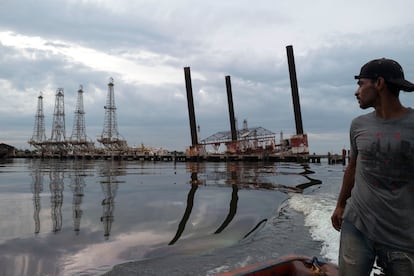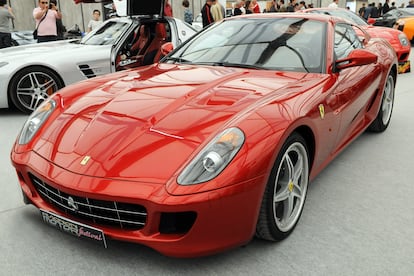How the group that plundered PDVSA spent their winnings: One helicopter, 22 armored vehicles, and $5 million in lawyer fees
A group of former Chávez government vice-ministers used funds stolen from Venezuela’s state oil company to hire a personal coach for $120,000, buy $123,900 of luxury tableware, and planned to purchase a $350,000 Ferrari

A network of former Chavista officials investigated in Andorra for stealing $2 billion from Petróleos de Venezuela (PDVSA) went on a wild spending spree as they plundered the coffers of the country’s state-owned oil company. Among the purchases made between 2007 and 2015 with funds acquired through the graft scheme: a helicopter valued at $2.6 million, 22 vehicles (some of them armored) totaling $5.7 million, and a $5.2 million payment to a law firm, according to a confidential report by the Financial Intelligence Unit of Andorra (UIFAND) obtained by EL PAÍS.
According to the document, the organization purchased a new Eurocopter Ec135 helicopter for $2.6 million in November 2011. With a capacity for six passengers and one pilot, this model of aircraft features a spacious cabin and a noise reduction system, and is marketed as a reliable option for private travel.
The corruption ring, according to UIFAND, purchased the helicopter using Panamanian company High Advisory and Consulting S.A. — owned by businessman Luis Mariano Rodríguez Cabello, the group’s alleged frontman — as an intermediary. Authored by Andorran investigators (Andorra is a microstate nestled between Spain and France that was long considered a tax haven), the document is dated November 2022 and details the payments authorized by the organization through an intricate labyrinth of accounts managed by Banca Privada d’Andorra (BPA), the bank the network allegedly used to hide its illicit earnings.

Businessman Diego Salazar, the group’s alleged mastermind, spent an additional $356,263 between March and August 2009 on private jet flights, a sum that allowed him to pay for trips in a Hawker 1000, a plane designed for long-distance flights, with a capacity for up to eight passengers and two crew members.
Using Rodríguez Cabello’s shell corporation, the network that plundered PDVSA also bought 22 vehicles totaling $5.7 million between 2014 and 2015. The fleet of automobiles included eight Toyota 4Runner Limited SUVs, 12 Toyota Corollas, and an armored Toyota Land Cruiser bought from a dealership in Miranda, Venezuela, and another 2015 Toyota SUV, among others.
Security was one of the organization’s top priorities, which is why the group spent another $328,000 in stolen funds to armor their new fleet. Two SUVs were armored with level 5 protection, designed to prevent assaults and kidnappings and to withstand gunfire.
The dream of owning a Ferrari
Attraction to luxury was another fixation shared by the group of looters. In September 2011, Rodríguez Cabello received a $350,000 budget for the purchase of a Ferrari GTB Fiorano, an exclusive sports car constructed from aluminum. The report does not reveal whether he ultimately bought the vehicle or not.

Other scandalous and surprising spending involved the purchase of legal services. Through its frontman, the organization paid $5.2 million to the Venezuelan law firm Mata, Borjas and Priwin between 2011 and 2014. The invoices were billed using vague descriptions such as “fees for services” and “real estate project expenses.”
The lawyer Albino Ferreras Garza, who in 2011 was a partner in the aforementioned law firm, contracted by the company InverDT CA, in which Rodríguez Cabello and Diego Salazar were shareholders, described his professional relationship with the group of pro-Chávez politicians in an email response to an inquiry by EL PAÍS: “We were hired by the legal department of InverDT CA to attend to what, at the time, was an investigation into alleged money laundering conducted by the Andorran Attorney General’s Office,” the lawyer wrote.
Ferreras Garza maintains close relationships with Venezuelan authorities and served as a legal advisor to other individuals involved in the alleged bribery scheme, such as Rafael Sarría and Fidel Ramírez, according to reporting in Armando.info.
A $120,000 “coach”
An analysis of payments reveals some curious expenditures, including a $120,000 disbursed in March 2014 for coaching services.
The network, which managed a real estate emporium that included 21 luxury properties and was valued at $52 million, as revealed by EL PAÍS, used a large portion of its funds to refurbish and decorate its brick-and-mortar investments. For this purpose, the group spent some $200,000 to remodel three apartments in the Torre Edicampo building in Caracas; another $200,000 on carpentry expenses; $198,369 for the lighting of offices and residential homes; $178,000 for air conditioning equipment; $80,530 for decorative items; and $55,489 for “advice on security and infrastructure,” according to the documents.
The decoration and accessories section of the investigation includes an invoice for 123,900 euros that the network paid to the exclusive French silverware and tableware store Christofle in October 2012.
Entrepreneurs with stolen funds
Through Rodríguez Cabello, the organization that plundered PDVSA also spent more than one million euros on the construction of an industrial kitchen in Caracas. The sum included the disbursement of $169,484 in restaurant equipment.
Some thirty former PDVSA officials and Chavista leaders were part of the network that plundered the state-owned company between 2007 and 2012. The corruption ring included top officials in the government of former president Hugo Chávez (1999-2013) including Vice Ministers of Energy, Nervis Villalobos and Javier Alvarado. Some individuals involved in the scheme allegedly received a 10% cut from businesses — Chinese firms in particular — that were awarded public contracts by the energy company and its subsidiaries.
To conceal the dirty money allegedly acquired through the payment of bribes, the organization hid its income using an opaque chain of BPA accounts, which stored their winnings some 7,400 kilometers from Caracas. This offshore banking network circulated funds through some thirty different companies in Switzerland and Belize.
To conceal the theft under a veneer of legality, the funds were billed for consultant contracts that, according to the investigators, did not exist. The Andorran authorities accused the group’s members of using banking companies to launder money. And BPA, the bank that processed the flow of dirty money, was seized by Andorran authorities in 2015 for alleged money laundering conducted on behalf of criminal groups.
Sign up for our weekly newsletter to get more English-language news coverage from EL PAÍS USA Edition
Tu suscripción se está usando en otro dispositivo
¿Quieres añadir otro usuario a tu suscripción?
Si continúas leyendo en este dispositivo, no se podrá leer en el otro.
FlechaTu suscripción se está usando en otro dispositivo y solo puedes acceder a EL PAÍS desde un dispositivo a la vez.
Si quieres compartir tu cuenta, cambia tu suscripción a la modalidad Premium, así podrás añadir otro usuario. Cada uno accederá con su propia cuenta de email, lo que os permitirá personalizar vuestra experiencia en EL PAÍS.
¿Tienes una suscripción de empresa? Accede aquí para contratar más cuentas.
En el caso de no saber quién está usando tu cuenta, te recomendamos cambiar tu contraseña aquí.
Si decides continuar compartiendo tu cuenta, este mensaje se mostrará en tu dispositivo y en el de la otra persona que está usando tu cuenta de forma indefinida, afectando a tu experiencia de lectura. Puedes consultar aquí los términos y condiciones de la suscripción digital.








































